Filing a complaint with a National Contact Point (NCP) can be a way to seek remedy for corporate harms and address corporate misconduct. However, before filing an NCP complaint, communities and their representatives should determine whether the OECD Guidelines apply and decide whether a complaint supports their broader strategy and goals.

Quick jump:
Step 1: Determine whether the OECD Guidelines apply
Who can file an NCP complaint?
What issues are covered?
Against which companies can you file a complaint?
When can you file?
How can you file?
Step 2: Consider strengths, limitations, and possible outcomes of a complaint
Outcomes
Agreements
Outcomes even if no agreement is reached
Unintended outcomes
Step 1: Determine whether the OECD Guidelines apply
The OECD Guidelines apply to many, but not all, situations of corporate harm. Consider the following questions to see whether you can file a complaint.
Who can file an NCP complaint?
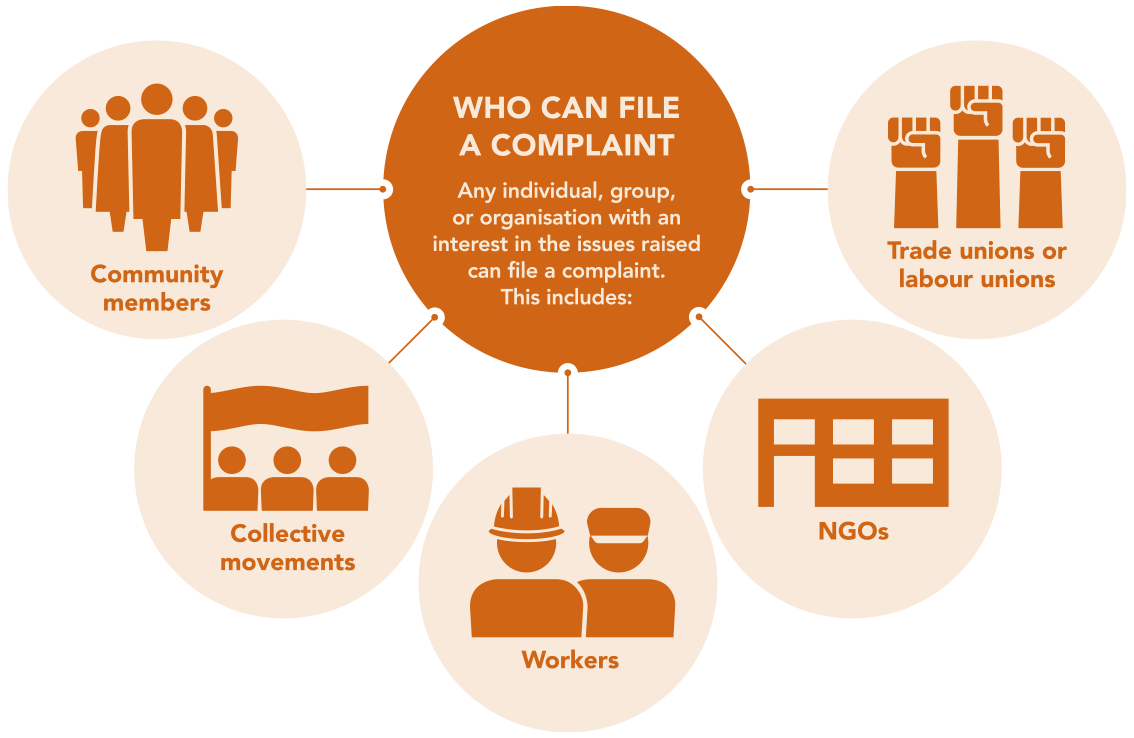
You can file a complaint about an alleged failure by one or more companies to follow the many standards in the OECD Guidelines. The Guidelines are very broad, so most issues are covered. Complaints can be filed about past harms not properly addressed by a company, harms currently occurring, or harms that may occur in the future if a company goes ahead with planned activities.
Against which companies can you file a complaint?
You can file a complaint against one or more companies that are connected to the harm. However, the company must either be headquartered in one of the 51 countries that follow the Guidelines, or the harm must be occurring in a country that follows the Guidelines.
Complaints can be filed before, during, or after alleged harms occur. Sometimes, NCP complaints deal with the same issues that are being dealt with by another grievance mechanism, like a court or tribunal. These kinds of cases are called ‘parallel proceedings’. We have developed guidance for civil society on how to pursue NCP complaints when matters are being addressed in parallel proceedings.
Follow OECD Watch’s guidance on how to draft an effective and strategic complaint.
Step 2: Consider strengths, limitations, and possible outcomes of a complaint
If you have determined that the OECD Guidelines apply, consider the strengths, weaknesses, and limitations of the NCP complaint process to decide whether filing a complaint is the right tool to use to challenge the harms you are facing.
NCP complaints can be a useful tool to fight for justice against corporate harm. They offer advantages over other types of claims:
- Accessibility: NCPs are more accessible to complainants than courts or administrative tribunals. The NCP complaint process is usually cheaper, faster, and simpler than litigation, and the amount of evidence needed for the complaint to be accepted by the NCP is lower.
- Issue-coverage: Because the OECD Guidelines set out a broad range of social and environmental standards that companies should respect, NCP complaints often cover more issues than under national law.
- Country-coverage: NCP complaints can be filed against companies operating anywhere in the world as long as the company involved is headquartered or operates in a country that follows the Guidelines.
- Focus on dialogue: NCP complaints are less adversarial (or combative) than court cases because they are focused on dialogue between the complainant and the company to reach an agreement.
- Remedy possibilities: Companies can agree to a wider range of responses or remedies than under national law, such as preventing harms that might occur in the future, stopping current harms, improving future practices, strengthening corporate policies, cleaning up harms (such as pollution), and compensating victims (although this is currently rare).
- Recommendations and determinations: Even if mediation does not reach an agreement, NCPs can make recommendations to encourage better company observance of the Guidelines and may determine that the company’s conduct met or fell below the Guidelines’ standards.
Although good outcomes are possible, they are not guaranteed. NCPs and the complaint process have serious limitations that you should carefully consider before deciding to file:
- Non-binding standards: The OECD Guidelines are not binding on companies. This means that NCPs cannot require a company to participate in a complaint or take action to remediate or prevent harm. There are also usually no formal consequences if a company initially decides to mediate but later withdraws from the complaint process.
- Voluntary: At best, NCPs can only critique poor company conduct and encourage action. While some NCPs have actively promoted meaningful resolution of complaints and remedy of harm, not all NCPs have a strong track record in this. As OECD Watch’s NCP evaluations show, there are big gaps in the performance of different NCPs.
- Few agreements: Historically, the NCP complaint process has not led to many agreements between the parties. For example, only around 10% of complaints filed by civil society have reached an agreement.
It is important to consider the strengths and limitations of the NCP complaint process, as well as the possible outcomes, within your larger strategy for justice.
Outcomes
NCPs use mediation to facilitate dialogue between the complainant and the company to encourage them to reach an agreement. Agreements can include many different types of remedies, and even when no agreement is reached, the complaint process can lead to positive outcomes for complainants.
Agreements
Agreements can include action to remedy harms that occurred in the past and/or are continuing, as well as action to prevent similar harms from happening in the future.

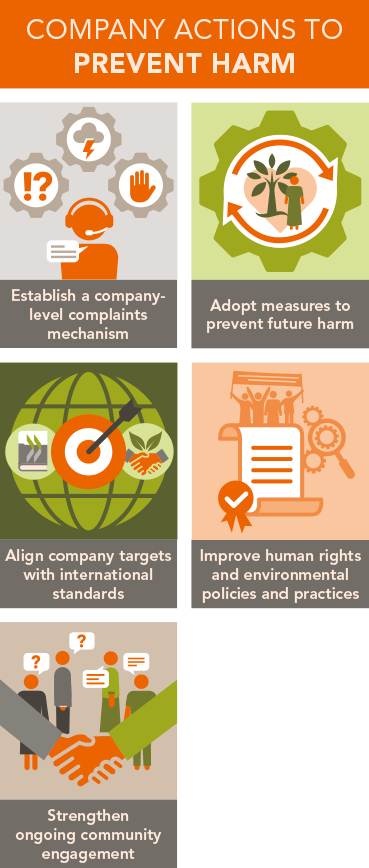
- Examples of agreements reached during NCP mediation.
Outcomes even if no agreement is reached
Even if no agreement is reached, the complaint process may still lead to positive outcomes that advance your broader strategy for justice:
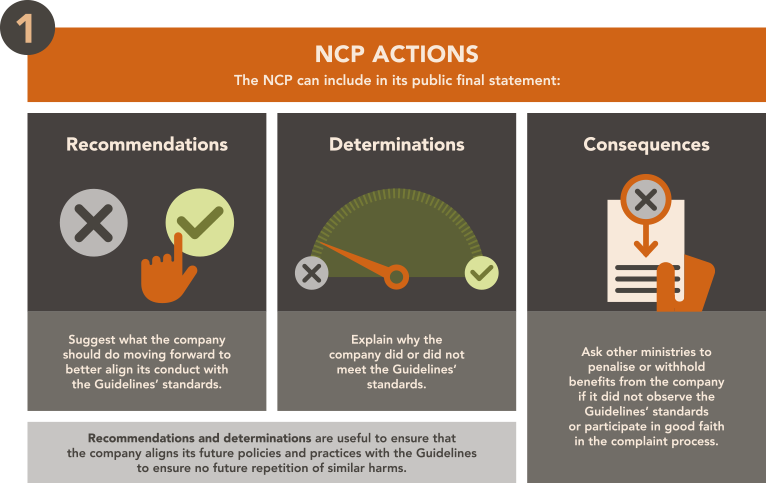
- Examples of determinations by NCPs.
- Examples of consequences by NCPs.
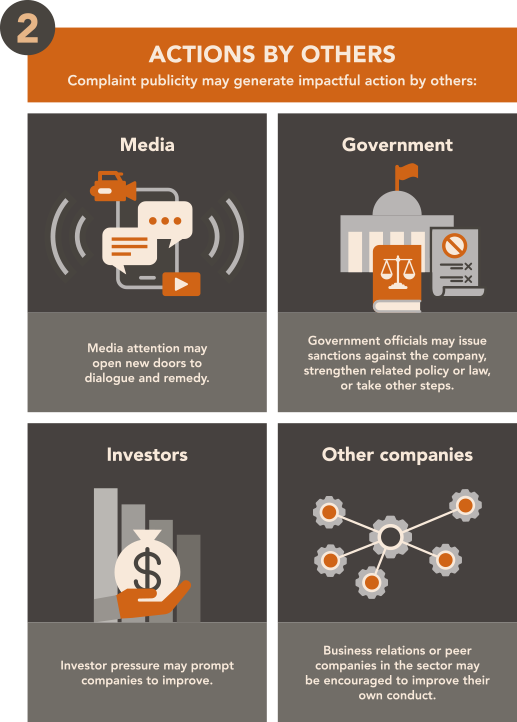
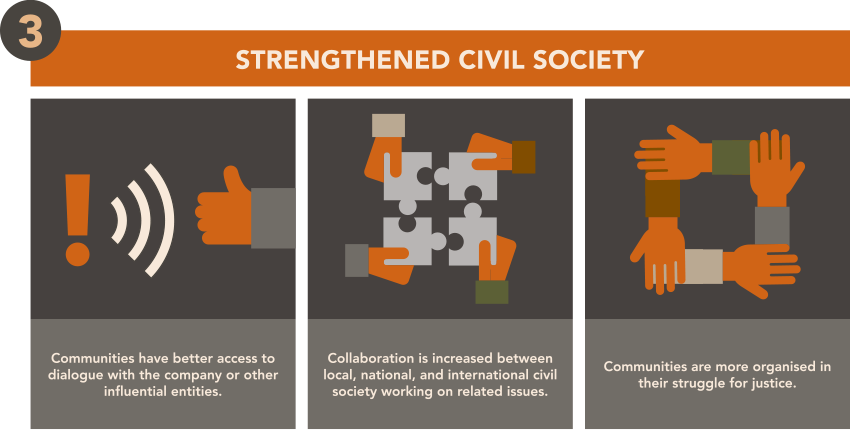

Sometimes, an NCP complaint may lead to unintended outcomes. For example, the company may push back on the issues raised in the complaint, or the NCP could conclude that the company actually followed the standards in the Guidelines.

Companies could retaliate against the individuals or organisations that filed the complaint. NCPs are aware of the possibility of reprisals against complainants and should take all appropriate steps to ensure the proceedings are safe for all participants. Contact OECD Watch if you are experiencing or are concerned about reprisals related to an NCP complaint.
Sometimes, filing an NCP complaint is not the right way forward.
Talking directly to a company may be faster and more impactful. It may also be a good idea to talk to the company’s business partners or shareholders, a government office, or the media. There may also be better remedy pathways, including filing a complaint to a court, tribunal, human rights commission, accountability mechanism of a development finance institution, or company or industry grievance mechanism.

